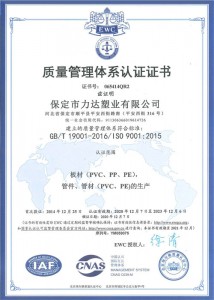Samh . 19, 2024 20:50 Back to list
HDPE Pipes for Efficient Water Supply Systems and Applications
The Role of HDPE in Water Supply Systems
High-Density Polyethylene (HDPE) has emerged as an essential material in the water supply industry, transforming how we manage our water resources. Known for its strength, durability, and flexibility, HDPE pipe systems offer numerous advantages over traditional materials such as steel and concrete. This article delves into the importance of HDPE water supply pipes, their benefits, applications, and environmental impact.
What is HDPE?
High-Density Polyethylene is a thermoplastic polymer made from petroleum. It is characterized by its high strength-to-density ratio, making it ideal for applications that require durability and resistance to various environmental factors. HDPE is classified as a plastic, but its properties allow it to withstand extreme conditions, including high pressure, temperature fluctuations, and corrosive substances. These characteristics make HDPE one of the most suitable materials for water supply systems.
Advantages of HDPE Water Supply Pipes
1. Corrosion Resistance One of the most significant advantages of HDPE over traditional materials is its resistance to corrosion. Steel pipes often suffer from rust and deterioration when in contact with water, leading to costly maintenance and replacements. HDPE pipes, on the other hand, do not rust, which allows for a longer service life and reduced maintenance costs.
2. Flexibility and Lightweight HDPE pipes are considerably lighter than metal pipes, making them easier and cheaper to transport and install. Their flexibility allows them to bend around obstacles and adapt to shifting ground conditions, reducing the likelihood of damage during installation or in adverse weather conditions.
3. Leak-Free Joints HDPE pipes can be joined using various methods, including heat fusion, which creates a homogeneous and leak-free joint. This feature significantly reduces the risk of water loss and contamination, ensuring that the water supply remains safe and efficient.
4. Chemical Resistance Another critical advantage of HDPE is its resistance to a wide range of chemicals, including those commonly found in municipal water supplies. This property ensures that the integrity of the water is maintained without leaching harmful substances into the supply.
hdpe water supply pipe

5. Environmental Benefits HDPE is 100% recyclable, making it an environmentally friendly choice for water supply systems. The production and transportation of HDPE require less energy compared to other materials, contributing to lower greenhouse gas emissions. Furthermore, the long lifespan of HDPE pipes reduces the need for frequent replacements, minimizing waste.
Applications in Water Supply Systems
HDPE pipes are versatile and can be used in various water supply applications, including
1. Potable Water Distribution HDPE pipes are safe for transporting drinking water. Their non-toxic nature ensures that the water remains uncontaminated, making them ideal for municipal water supply systems.
2. Agricultural Irrigation In agriculture, HDPE is widely used for irrigation systems. Its flexibility and durability allow for efficient water delivery in farming operations, enhancing crop yields and water usage efficiency.
3. Wastewater Systems HDPE is also suitable for wastewater applications. Its resistance to chemicals and corrosion makes it ideal for transporting wastewater without degrading over time.
4. Fire Protection Systems HDPE pipes can be employed in fire protection systems, providing reliable water supply for firefighting equipment such as hydrants and sprinkler systems.
Conclusion
As our water supply systems face increasing strain from population growth, urbanization, and climate change, the need for reliable, efficient, and sustainable solutions becomes more pressing. HDPE water supply pipes represent a significant advancement in piping technology, offering numerous benefits that enhance the efficiency and safety of water distribution. Their resilience, longevity, and environmental friendliness make them a superior choice for current and future water supply challenges. By embracing HDPE as a primary material in water management systems, we can work towards securing a more sustainable and resilient water future.
-
PVC Grey Sheet for Extraction: Chemical Resistant & Durable
NewsAug.19,2025
-
Durable PVC Pipe Fittings for Plumbing & Irrigation Needs
NewsAug.18,2025
-
HDPE Steel Belt Reinforced Spiral Corrugated Pipe | High Strength
NewsAug.17,2025
-
HDPE Pipe Fittings: Durable, Leak-Proof Solutions
NewsAug.16,2025
-
Premium CPVC Sheet: High-Temp & Chemical Resistant Solutions
NewsAug.15,2025
-
Durable PPR Pipe for Hot & Cold Water Systems - Easy Install
NewsAug.14,2025

